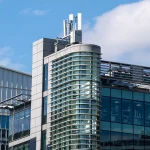N.Ireland Assembly Blasts Broadband and Mobile Providers Over Storm Eowyn Response

Members of the Northern Ireland Assembly have this week criticised UK broadband and mobile operators, particularly Vodafone, BT, EE, Sky Broadband, Vodafone, O2 and Fibrus, for their response to the damage caused by Storm Éowyn. The complaints touched on issues of slow repairs, absent compensation and poor communication with customers.
Just to recap. Storm Éowyn (pronounced ‘Ay-oh-win’), which was the result of explosive cyclogenesis (aka – a weather bomb), struck parts of the UK on Friday 24th January 2025 (here and here) and focused most of its destructive energy (wind speeds of up to 114mph) on Northern Ireland and Scotland.
Openreach has already reported that the storm “badly damaged“, among other parts of their infrastructure, more than 500 telecoms poles (here). But other networks were also hit hard and many are still in the process of trying to fully restore their services to all of the worst hit locations.
Advertisement
Suffice to say that some of the issues being caused by all this came up for debate on Monday in the NI Assembly. As Diana Armstrong (UUP) said: “All major telecom providers have sustained severe damage to the networks, and, unfortunately, it could be some time before normal services resume. I have liaised with all major providers, such as BT, Fibrus, Sky, Vodafone and O2, about the concerns of customers who have been left without service, particularly the elderly [and] vulnerable people.”
Diana added that she was aware that there would be a “shortage in the procurement of fibre cable and other components” that will compound the delays being felt in many homes and businesses. But she added that “many of the big providers” are bringing over engineers from Great Britain to “assist in the restoration efforts“. But plenty of other assembly members were quick to raise concerns and complaints, a few of which have been quoted below.
Deborah Erskine (DUP) said:
“Ten days ago, the storm took out five telecoms masts, even threatening critical blue-light communications, yet customers, many of whom are elderly, vulnerable or running businesses, are still without broadband and mobile services with no estimated restoration time. While NIE has been able to provide restoration times, multimillion-pound companies such as Vodafone, BT, EE and Fibrus have failed to do the same. People in my constituency are being forced to travel to access networks at their own expense.
This is not a time for telecoms companies to hide. They must communicate with customers urgently, and action must be taken.”
Patsy McGlone (SDLP) said:
“I think that £165 million of public moneys were spent on Project Stratum, which has been referred to. Minister, will you get your officials to urgently convene a meeting with those providers, because, at the moment, it seems that absolute non-communication with their customers is run-of-the-mill for them? I referred five cases to Fibrus this morning, and, in the last five minutes, I have been informed of another case in which a business has been told that it will be 10 February before anyone will be out to attempt to repair its supply.”
Steve Aiken OBE (UUP) said:
“Have your Department or your officials been in contact with the providers of mobile telephone communication systems in particular? Those are items of critical national infrastructure, and they seem to have failed at the first hurdle. There do not seem to be any examples of battery backup or internal power supplies to keep the systems working. That is probably contrary to what Ofcom would recommend.”
David Brooks (DUP) said:
“My colleague from Fermanagh and South Tyrone, who tabled the question for urgent oral answer, has told me today that one of her constituents has been told that it will be 16 February before Fibrus links them up again. Does the Minister agree that that is wholly unacceptable.”
Jonathan Buckley (DUP) said:
“We know that the storm caused significant damage across Northern Ireland, and I pay tribute to the many agencies that put in sterling work to get people reconnected. That was lacking from Fibrus; there were no communications, and constituents still face huge challenges in relation to broadband connection. “
Alternative broadband operator Fibrus was singled out a number of times during the debate, albeit perhaps disproportionately due to the publicly funded Project Stratum contract they hold that has seen them rolling out FTTP broadband to 80,000 premises across rural parts of Northern Ireland (due to complete in the coming months). Fibrus is also one the largest providers in the rural areas worst hit by the storm, where the lack of mains power has been one of the biggest holdups (this often gets conflated with broadband).
The Minister for the Economy, Caoimhe Archibald (Sinn Féin), pointed out that 6,000 premises on the Fibrus network are “currently without connection” – mainly in Fermanagh and South Tyrone and Mid Ulster. But she also noted how that figure had significantly reduced from last week’s peak of 40,000 premises.
Advertisement
The question of compensation also came up a few times and it’s worth noting that some of this will be covered by Ofcom’s Automatic Compensation scheme, which is designed to compensate consumers by £9.76 per day for delayed repairs following a loss of fixed line broadband or phone (assuming it isn’t fixed within 2 working days). But this is a voluntary scheme and only supported by BT, EE, Hyperoptic, PlusNet, Sky Broadband (inc. NOW TV), TalkTalk, UW, Virgin Media, Vodafone and Zen Internet.
However, Gary Middleton (DUP) noted how Fibrus had indicated that, if your internet has been off for more than 48 working hours, “you are entitled to compensation” (Fibrus are not a member of Ofcom’s own compensation scheme). We asked the provider about the details of this and they kindly informed us that the compensation policy is £5 per day, albeit “starting 48 hours after their power has come back on” (i.e. they don’t compensate when the cause is related to a lack of mains power).
The issue of battery backup at mobile sites was also raised, although Ofcom is currently still examining the costly and complicated problem of improving battery backup (here). Ofcom previously noted that only around 20% of all mobile sites in the UK have some backup functionality at the Radio Access Network (RAN) level for more than 15 minutes, while only around 5% of sites are able to withstand a six-hour power loss (excluding battery backup for transmission traffic). Nevertheless, battery backup is not a panacea for all such difficulties and has its own limits, as well as not being viable for all mobile sites.
A spokesperson for Mobile UK, which represents the operators, told ISPreview:
“We understand how critical mobile service is, especially during emergencies. Our teams are working around the clock to repair damaged equipment, clear debris, and restore power to affected infrastructure. Mobile operators are committed to keeping customers connected and informed throughout this process.
The mobile industry recently met with the Economy and Infrastructure Ministers to discuss opportunities to progress the Mobile Action Plan for Northern Ireland to identify and mitigate barriers to mobile deployment. We hope that with the recent reshuffle to both these departments the commitment to explore a ministerial taskforce can be expedited quickly, especially in light of the recent storms.”
Mobile UK added that operators were also deploying portable cell sites to provide temporary coverage in areas where cell towers are down, as well as dispatching additional crews, working with power companies to get mains power back online and “providing regular updates to customers” (i.e. through social media, text messages, and other channels).
Advertisement
ISPreview also asked Virgin Media (O2) and EE (BT) to comment on the situation, although EE directed us to Openreach (they’ve already given a UK wide update – but not one for NI specifically) and Virgin Media didn’t respond. However, we did get a comment from Sky, which is pasted below.
A Sky Spokesperson said:
“A very small number of our customers may be experiencing issues with their Sky services as a result of the ongoing impact of Storm Eowyn. We are seeing that the majority of impacted customers have had their services restored. We are extremely sorry for any ongoing disruption this is causing; our teams are working tirelessly to ensure all issues are resolved as soon as possible.”
Caoimhe Archibald added that a post-incident review of the storm will take place on 10th February 2025, and it will assess all of the impacts and any lessons learned. “Clearly, there are lessons that have to be learned in respect of mobile and other connectivity. Officials are, of course, engaging through the structures that are there with all the relevant parties to ensure that, first, the response is happening but then to assess the way forward,” added the minister.
Such major events, which can impact a wide area, represent an extreme challenge for network operators to tackle and this can put a strain on their resources. Suffice to say that this can manifest as delays, protracted outages and a weakening of communication / support as engineers try to reconnect everyone as quickly as possible.
This is before we even consider that the network operators have to work with suppliers (e.g. energy providers) that will be facing challenges of their own. Not to mention the usual delays from the need to secure road permits/permissions from local authorities for certain jobs, constraints in the availability of engineering resources / materials and the requirement to make a site safe before engineers can start work.
We often expect telecoms engineers to work miracles, but the reality can be a bit more of a slog. On the other hand, poor communication with customers during major service outages remains far too much of a common occurrence, with many providers still in lack of an informative and regularly updated Service Status page.
Mark is a professional technology writer, IT consultant and computer engineer from Dorset (England), he also founded ISPreview in 1999 and enjoys analysing the latest telecoms and broadband developments. Find me on X (Twitter), Mastodon, Facebook, BlueSky, Threads.net and Linkedin.
« Openreach and Nokia Claim UK’s First Live Test of 50Gbps Broadband UPDATE





















































“(wind speeds of up to 114Mbps)” ultrafast winds.
Curse my networking focused brain 🙂
No doubt anonymous will be on to complain they weren’t symmetric wind speeds.
Fibrus should never have been given the contact as they are too small. Should have just given the money to Openreach, who announced recently they were going to upgrade the network anyway in N.Ireland. Openreach have far more staff out in the field for repairs.
To be fair, it looks like Fibrus are going to complete the build more or less on time and within budget. The extra competition they’ve brought should also help to ensure that more areas in NI have access to cheaper broadband.
https://www.ispreview.co.uk/index.php/2024/04/project-stratums-n-ireland-full-fibre-build-on-target-for-81000-premises.html
Openreach could have committed to do their FTTP build in the intervention areas long before the contract was signed, which would have changed the whole rationale of the contract. But they left it too late.
It’s an almost impossible problem. Employ enough field techs to be able to get tens of thousands of customers back on quickly and your pricing will be so high to pay for them that you’ll have no customers anyway.
I’d like to see more pressure applied to electricity companies – it’s their failure to provide power that causes many of these problems. If your electricity goes off and the food in your freezer is ruined, you don’t blame the makers of your freezer – yet that’s what we do with telecoms, blame the freezer maker.
It’s going to be even more of an issue if you have one of the ‘Smart’ freezers. https://www.bosch-home.co.uk/bosch-innovations/homeconnect/homeconnect-fridges (Sorry, couldn’t resist)
Mine has been off since the storm started they have been out loads of times still not fixed the should be ashamed
NIE can reconnect 500 customers with the repair of one cable . Where as telecoms is more complex maybe only connect 10 customers with the repair of a cable so will take more time to get everyone in service .
The advice when bad weather comes in, is to have your mobile fully charged, in case there is a power cut. (If you’ve switched to VoIP there’s no POTS to rely on). However, not much use if the mobile mast is on the same power source.
Maybe they should have laid a power cable alongside the fibre serving the cell tower, back to a town level generator shared by all cells (all operators) in a given area geographic area to cope in emergencies